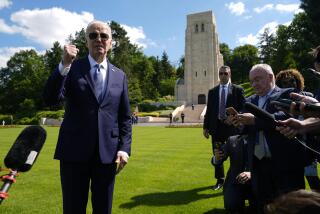German Veterans Honor Their War Dead
- Share via
LA CAMBE, France — Uninvited to D-day ceremonies, German veterans remembered fallen comrades Saturday at Normandy’s largest cemetery, where some of their former enemies joined them in sometimes tearful reconciliation.
In a cold, blowing rain, a French military band played the French and German national anthems as soldiers of both countries stood at attention, encircled by the graves of more than 21,000 German soldiers. Four former members of the French Resistance held their groups’ flags before a monument to an unknown soldier, where children laid wreaths.
In French and German, officials from both countries spoke of the losses as well as of the new Europe that rose from the ashes of World War II.
“Their graves provide witness to the horrors of war and remind us living of the memory of the death, suffering and misery of millions of human beings,” said Capt. Guenther Porrio, Germany’s naval attache in Paris.
Today, Franco-German reconciliation “is of decisive importance to the evolution and future of our continent,” he told the crowd of about 300.
A few miles from Omaha Beach, a low, granite entrance leads into the cemetery containing 21,222 graves of German soldiers, each marked with a small, flat stone.
The main American cemetery nearby has about 9,300 graves. Most U.S. war dead were repatriated.
“Thank God it’s over, that the horrible battle can’t happen again,” said a tearful Helmut Mechemer, who was 20 when he was near Pointe-du-Hoc, a rocky German stronghold assaulted by the Americans. This time he came with American vets.
“We met in 1984 in Sainte-Mere-Eglise, and we’ve been friends since then,” said Warren Lloyd, 73, of Orlando, Fla.
“We fought for our Deutschland,” said Guenther Koehler, 68, who was a teen-ager on D-day. “We were 180 soldiers on June 6, and at the end of the day we were three.”
Many cities in France have German twin cities, though hatred lingers, especially among elderly French. Plaques in some towns marking Nazi killings still refer insultingly to Germans.
“My first feeling is that it is very logical that the French didn’t invite the Germans,” said Franz Meyer, in charge of German cemeteries in Normandy and Brittany.
But, he said, the Germans could be invited later--perhaps for the 50th anniversary of Germany’s surrender.
There were emotional ceremonies as well in Norman villages and towns as thousands of veterans, many hosted by grateful French families in their homes, returned to the scene of their battles on what the local press has dubbed “The Longest Weekend.”
At one such ceremony, 40 veterans of the U.S. 1st Infantry Division, led by Gen. Albert Smith, 75, who landed at Omaha Beach amid carnage early on June 6, 1944, prayed together at the cemetery at Colleville-sur-Mer, overlooking the coast.
Nearly 3,000 Americans died fighting for that strip of sand fringed by cliffs. In a eulogy, Smith recalled the unit’s motto: “No mission too difficult, no sacrifice too great. Duty first.”
The veterans were saluted by 21 guns and an honor guard from the North Atlantic Treaty Organization’s military headquarters in Mons, Belgium.
More to Read
Sign up for Essential California
The most important California stories and recommendations in your inbox every morning.
You may occasionally receive promotional content from the Los Angeles Times.













